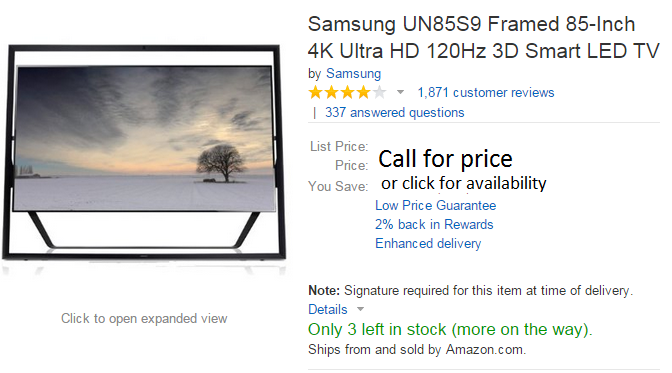Personally, if I’m ready to buy something, I need to know two basic things. First, what’s my excitement level for it and secondly, how much is it? That makes sense right? Overextending oneself is something one does right out of college when you think you have the world at your feet and assume that money grows on trees and so you run up your credit cards because you’re young and dumb. Not that I would know anything about that. Most people, though, are much smarter, whose thoughts are driven by the need to have what they want, balanced by how much they can afford. Fundamentally, at the end of the day, it’s really all about affordability – and at its heart – price.
I stumbled across funny reviews for a really huge television on Amazon a few weeks back. I admit I was intrigued by the size of this thing. 85 inches of pure 4K High Definition goodness. Whoa. Then, I saw the price tag and had sticker shock and collapsed in a heap of I’ll Never Own a TV As Awesome As That.
The price – unaffordable – way out of my league – was ridiculous but thank you to Amazon for publishing the price and letting me know that I am not as financially sound as maybe I’d like.
Some Multifamily companies or dare I say it, ILS’s, would have advertised the television this way:
It’s annoying enough that sometimes I can only view a price when I add it to a cart. Some would argue that by getting someone to call or submit a form, you could sell the benefits and get them to buy it anyway. It’s a known fact that more than 59% of internet users shop online because it’s easier to find prices. Showing apartment pricing on websites isn’t a new concept, of course. We’ve all been doing it in some form or fashion for 10 years. If you aren’t at least showing a range of prices, you’re doing it wrong. If you’re showing specific unit availabilities, then you’re probably ahead of the game – but are you really?
Here’s where things get dicey.
I’ve mentioned many times in this blog that technology should help us provide a better experience for our users, our renters, us. Can you imagine if when searching for that TV, I had to click a button to be taken off Amazon’s site, dropped onto another website which kind of looked like Amazon but wasn’t run by either Amazon or the company who makes the TV, to pull a pricing feed that’s outdated by hours or days, to view televisions with names that don’t really relate to much of anything, to view prices that seem to change daily based on length of time but lack any transparency?
We’re asking our prospects to do that.
We are allowing our Property Management software or pricing systems to drive the front prospect user experience bus. It’s clumsy. Even worse are the instances where you think you’re going to get the unit pricing availabilities the website claims, but instead you’re given a lengthy contact form with a We’ll Call you Later. Meh.
Why do we accept this?
 To highlight my point, UDR just released a really amazing new website. They tell you the pricing on specific apartments is from [Insert price]. When you’re ready to lease, you must click Lease Now. A weird window pops up and the experience suddenly changes. This isn’t UDR’s fault. They are forced into doing this because they cannot natively pull their actual pricing from their Property Management system and make it work. The popup is merely web pages from their Property Management software’s host rather than UDR’s. It doesn’t look the same. It doesn’t function the same. All of that time and money they’ve spent to create the wonderful UX has now been handed off to someone else who doesn’t share the same vision.
To highlight my point, UDR just released a really amazing new website. They tell you the pricing on specific apartments is from [Insert price]. When you’re ready to lease, you must click Lease Now. A weird window pops up and the experience suddenly changes. This isn’t UDR’s fault. They are forced into doing this because they cannot natively pull their actual pricing from their Property Management system and make it work. The popup is merely web pages from their Property Management software’s host rather than UDR’s. It doesn’t look the same. It doesn’t function the same. All of that time and money they’ve spent to create the wonderful UX has now been handed off to someone else who doesn’t share the same vision.
This should not be acceptable anymore.
A few ILS’s are slowly trying to solve the availability and unit pricing dilemma. Some offer links but those links take you off of the ILS and onto other 3rd party sites unrelated to the property management company or ILS. The overall experience is reduced further still.
Unit availabilities and pricing should remain seamless and built in no matter the site. Expedia goes out and gets the prices and then shows them to you natively. There are no clicks off, no different screens, no entering a falsely branded 3rd party site. They are adaptable.
Home Depot, Walmart, Hotels.com, to name a few, have been trying out a new technology that will change prices according to website and shopping behavior. Could we get our websites to notice that you have viewed several other listings recently, viewed a property or two of ours and when someone visits our website again, adjust the price a little lower as an incentive? No, we can’t.
 We need better information flow. MITS, the technology behind our industry communications, hasn’t been updated since 2010, which in computer years, makes it 80 years old. We need better transparency, better, more adaptable technology, better interoperability, and more openness. The data is ours, we should be able to use it as we need to. Outdated, daily dump availabilities aren’t good enough. Information becomes stale far too quickly. Rent ranges need to go.
We need better information flow. MITS, the technology behind our industry communications, hasn’t been updated since 2010, which in computer years, makes it 80 years old. We need better transparency, better, more adaptable technology, better interoperability, and more openness. The data is ours, we should be able to use it as we need to. Outdated, daily dump availabilities aren’t good enough. Information becomes stale far too quickly. Rent ranges need to go.
If someone on our website wants a 2 bedroom apartment, allow them to select it on a property map, for how long, and for how much. We need to use our technology better. Changing the game starts now.
Happy renting everyone.







